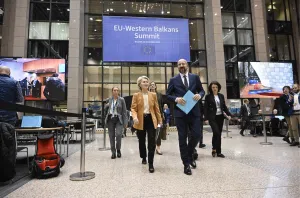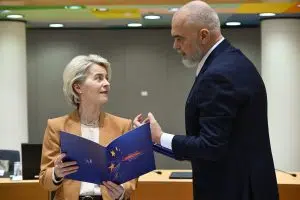Brussels – It is a summit of anticipation, suspended in the hope that the upcoming European Council will not blow the entire EU enlargement process. The annual summit between EU and Western Balkan leaders focused on progress on the political and especially economic front over the past year, but on a meeting where the issue of the partner countries’ accession to the Union is foundational to the specter of obstructionism hovered by Hungarian Prime Minister, Viktor Orbán, at the Summit of the 27 Heads of State scheduled for tomorrow and the day after (Dec. 14-15).

“We reaffirmed that the future of the six Western Balkan countries is within the European Union with gradual integration made explicit in a concrete way,” said the president of the European Council, Charles Michel, at a press conference at the end of the summit. Words confirmed by the leader of the EU Commission, Ursula von der Leyen: “We had a very good discussion at this summit,” based on the recently presented Enlargement Package. Regarding the November 8 report, von der Leyen noted that “the fundamentals’ cluster with Northern Macedonia and Albania should be opened as soon as possible,” while Montenegro experiences a “positive moment with the new government,” and Serbia and Kosovo “have made important commitments that now need to be implemented” in the context of the Prishtina-Belgrade dialogue. And then there is the most sensitive issue, the one on which a chess game with Orbán will begin from tomorrow: “We have recommended the opening of the accession negotiations with Bosnia and Herzegovina as soon as the conditions are met,” von der Leyen said, but without answering questions about how much the EU enlargement chapter is at risk because of the Hungarian premier’s possible veto of Ukraine’s EU membership. The starting point is the Tirana Declaration of 2022, both on reforms required for EU membership and strategic orientation “in light of Russia’s war of aggression against Ukraine,” reads the statement from the latest EU-Western Balkans summit, which again insists on making “rapid and sustained progress towards full alignment” with the Common Foreign and Security Policy (CFSP) “including on EU restrictive
measures and to act accordingly.” The implicit reference is to Serbia’s Aleksandar Vučić (absent in Brussels today and replaced by the premier, Ana Brnabić), still far from aligning with sanctions against Russia. At the same time, the statement also stresses the “strategic commitment” of the partners who are already “fully” in line with Brussels. On the more sensitive issues on the table, there is an explicit reference to support for efforts to normalize relations between Serbia and Kosovo in the EU-mediated dialogue: “We expect constructive engagement of the two Parties,” after a year of extreme tension between Pristina and Belgrade. But while the declaration calls for “refrain from unilateral and uncoordinated actions that could lead to further tensions and violence,” Kosovo’s president, Vjosa Osmani, urged EU leaders to “revoke the unjust measures” imposed since June 28.

European Commission President Ursula von der Leyen and Albania’s Prime Minister Edi Rama (Dec. 13)
At the political level, the highlight should be on point 9: “The EU intends to bring the Western Balkans closer by preparing the ground for accession and bringing concrete benefits to their citizens already during the enlargement process.” In this regard, EU institutions intend to “explore additional measures to further advance the gradual integration” – as something that President Michel has long been claiming – harnessing “the potential of existing legal instruments” and favoring it “already during the enlargement process itself, in a reversible and merit-based manner.” Welcomed in this context is the new EUR6 billion Western Balkans Growth Plan presented by the EU Commission, which “aims to accelerate socio-economic convergence” and “encourages the region to accelerate the pace of reforms” according to EU Single Market rules, as well as the participation of the six Balkan countries in the Foreign Affairs Council in November. On the economic front, there is the success of the €1 billion energy support package divided into two parts of 500 million: 90 percent – or €450 million – of the first half dedicated to cushioning energy price increases on households and businesses “has already been disbursed.” The remaining €500 million in grants will be provided through the Western Balkans Investment Framework, targeting renewables, energy infrastructure, and interconnectors. Let’s also not forget the Economic and Investment Plan of nearly 30 billion euros in 2021-2027, “in an advanced stage of implementation,” with 16.6 billion “already mobilized”. And finally, there is the issue of migration, on a day punctuated by a blunder by President von der Leyen over the migration agreement between Italy and Albania. “The route is still very active, with a high number of irregular border crossings,” notes the statement about the Balkan route and last year’s Action Plan, with a reminder of visa policy: “The EU calls for further alignment to avoid abuses of Member States’ migration and asylum systems.” From January 1, 2024, thanks to the liberalization also for Kosovar citizens, “all people from the entire Western Balkan region will be able to travel visa-free in the Schengen area.”
On the economic front, there is the success of the €1 billion energy support package divided into two parts of 500 million: 90 percent – or €450 million – of the first half dedicated to cushioning energy price increases on households and businesses “has already been disbursed.” The remaining €500 million in grants will be provided through the Western Balkans Investment Framework, targeting renewables, energy infrastructure, and interconnectors. Let’s also not forget the Economic and Investment Plan of nearly 30 billion euros in 2021-2027, “in an advanced stage of implementation,” with 16.6 billion “already mobilized”. And finally, there is the issue of migration, on a day punctuated by a blunder by President von der Leyen over the migration agreement between Italy and Albania. “The route is still very active, with a high number of irregular border crossings,” notes the statement about the Balkan route and last year’s Action Plan, with a reminder of visa policy: “The EU calls for further alignment to avoid abuses of Member States’ migration and asylum systems.” From January 1, 2024, thanks to the liberalization also for Kosovar citizens, “all people from the entire Western Balkan region will be able to travel visa-free in the Schengen area.”
Where does EU enlargement stand in the Western Balkans
 Of the six Western Balkan countries that have begun the long road to EU membership, four have already started accession negotiations – Albania, North Macedonia, Montenegro, and Serbia – one has received candidate status – Bosnia and Herzegovina – and one has formally applied, and is awaiting the response of the 27 Member States – Kosovo. Tirana and Skopje began negotiations in July last year after waiting eight and 17 years, respectively, while Podgorica and Belgrade have been at this stage for 11 and nine years, respectively. After six years of applying for EU membership, on December 15 last year, Sarajevo also became a candidate to join the Union and now eagerly awaits the European Council’s decision on the start of accession negotiations, which, according to the EU Commission’s EU Enlargement Package 2023 can take place “once the necessary degree of compliance with the accession criteria has been achieved.” Pristina is in the most complicated position after the formal request sent late last year: since the unilateral declaration of independence from Belgrade in 2008, five EU member states do not recognize it as a sovereign state (Cyprus, Greece, Romania, Spain, and Slovakia) and in parallel are relations with Brussels have soured after diplomatic tensions with Serbia in late May.
Of the six Western Balkan countries that have begun the long road to EU membership, four have already started accession negotiations – Albania, North Macedonia, Montenegro, and Serbia – one has received candidate status – Bosnia and Herzegovina – and one has formally applied, and is awaiting the response of the 27 Member States – Kosovo. Tirana and Skopje began negotiations in July last year after waiting eight and 17 years, respectively, while Podgorica and Belgrade have been at this stage for 11 and nine years, respectively. After six years of applying for EU membership, on December 15 last year, Sarajevo also became a candidate to join the Union and now eagerly awaits the European Council’s decision on the start of accession negotiations, which, according to the EU Commission’s EU Enlargement Package 2023 can take place “once the necessary degree of compliance with the accession criteria has been achieved.” Pristina is in the most complicated position after the formal request sent late last year: since the unilateral declaration of independence from Belgrade in 2008, five EU member states do not recognize it as a sovereign state (Cyprus, Greece, Romania, Spain, and Slovakia) and in parallel are relations with Brussels have soured after diplomatic tensions with Serbia in late May.






